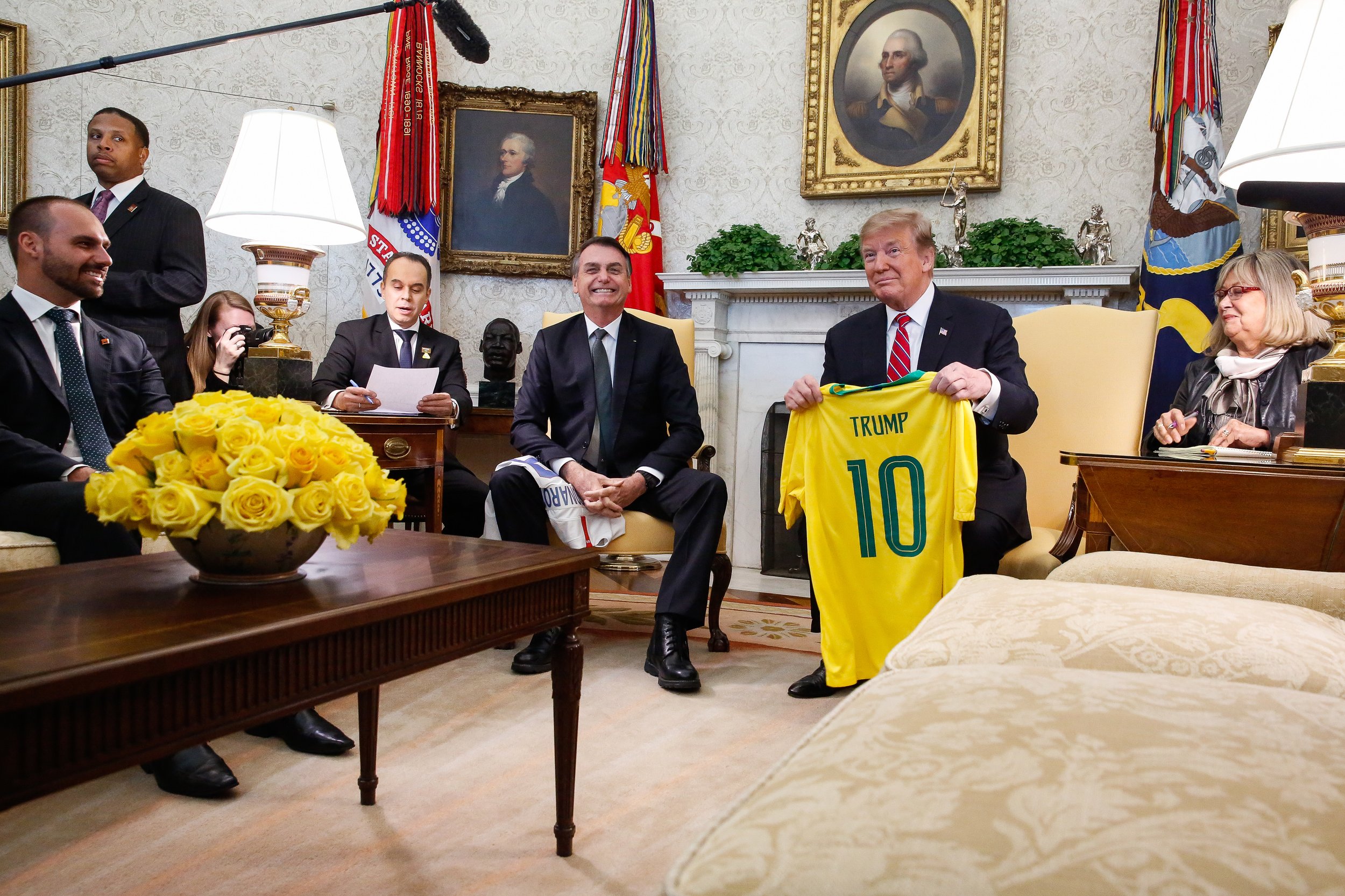International Migrants on the Far Right and the Transnationalization Fronts of Bolsonarism in the US
By Teresa Cristina Schneider Marques*
Trumpism and Bolsonarism comprise the so-called "neopatriotic far right," a political movement that, according to Sanahuja and Burian (2024), may have specificities in each country, but which shares a discourse of distrust in the electoral processes of liberal democracies. This "ideological synergy" has made the two countries a hub for transnational and international articulation of the Brazilian far right, according to Paulo Abrão (2024). Furthermore, the United States has the largest population of Brazilians living abroad—over 2 million—and became the foreign country where Bolsonaro achieved his largest extraterritorial electoral victory in 2022.
Bolsonaro's transnationalization strategy intensified in 2022, following the defeat in the Brazilian elections and the failed attack on the headquarters of national political institutions on January 8, 2023. These harsh defeats for Bolsonarism led to a decrease in the resources available for Bolsonarism's political action at home. When this occurs, actors tend to seek transnational projection of their causes, aiming for a "boomerang" effect identified by Keck and Sikkink (1998), that is, they hope that their demands, after being welcomed abroad, will return stronger to their home country.
Trump's election in 2024 strengthened the global right, opening new opportunities for Bolsonarism, especially as a result of the "domestication" of its cause in the United States. According to Tarrow and Della Porta (2005), this process of transnationalization involves efforts to have the cause "adopted" by a second country. In doing so, Brazilians hope that these American partners will intervene directly in their home country to support their demands, thus completing the "boomerang effect." This possibility becomes even stronger in a country like the United States, given its geopolitical, military, and economic importance.
Aiming to promote the "adoption" of Bolsonarism not only by U.S. political institutions but also by economic, social, and cultural forces, three fronts of Bolsonarist action are becoming increasingly evident. First, political institutions and parties stand out. As rightly pointed out by Casarões and Belém López (2025), Bolsonarism has implemented a series of actions in this regard. Transnational partisan connections and the international circulation of members of the pro-Bolsonaro political elite through lobbying and other practices are a structuring part of the efforts to promote the "adoption" of the Bolsonarist cause by the United States.
There has also been an investment in U.S. public opinion. As João Batista Júnior, a reporter for Piauí magazine, discovered, Eduardo Bolsonaro has spent much of his time being interviewed by all types of media outlets—from television to podcasts on online platforms. The space provided by local media—including small and rural media outlets—and liberal think tanks and institutes is important for winning over U.S. public opinion and thus securing the necessary support for Trumpist measures targeting Brazil.
Finally, although it receives less academic attention, the research we conducted within the Observatory of Transnational Collective Action and Comparative Politics (OAPoc) found that Bolsonarism has also directed part of its efforts toward mobilizing the Brazilian community living in the United States. This population has the potential to support the first two fronts, given their linguistic attributes and their integration into personal networks that allow them to leverage diverse resources, both in their country of origin and in their country of residence. Thus, international migrants can contribute to the transnationalization of political forces by performing various tasks essential to this process: building alliances; translating narratives into a specific cultural and linguistic context; mobilizing and distributing financial, organizational, symbolic, and cultural resources; projecting and amplifying actors and ideas, etc.
The Brazilian community has become the third front of Bolsonarism's action in the United States, demonstrating the need to abandon any homogenizing or normative perspective on the migrants. Several actions have been undertaken to increase the motivation and engagement of this population, and also to mitigate any costs that could arise from this group's political action.
Several pro-Bolsonaro activists who migrated to the United States—notably blogger Allan Santos, the former Jovem Pan commentator; journalist Paulo Figueiredo; and Congressman Eduardo Bolsonaro—seek to establish strong relationships with these communities, encouraging their members' engagement and participating in the organization of events and protests, using their own social media channels as one of their tools. Of note is their contact with supporter groups such as "Yes Brasil," based in Florida, and a Brazilian group from Massachusetts that is leading the organization of the "Brazilian conservative Congress in the United States," an event held annually since 2022.
Pro-Bolsonaro actors residing in Brazil are also driving this movement. The 2022 motorcycle rally in Orlando which was attended by Jair Bolsonaro himself and the allocation of R$127,000—an amount calculated only through 2023—for the participation of right-wing congressmen in conservative events organized by migrant communities, especially in the United States, as verified by Scofield for Agência Pública (2023), clearly demonstrate that Bolsonaristas have identified the potential of this population for their transnationalization project. Such actions strengthen nationalist sentiment and integrate these communities through a shared political identity anchored in conservative values.
Therefore, Bolsonarism's transnationalization strategy is well-structured and designed on multiple scales. In the United States, it encompasses everything from U.S. institutions and political parties to the Brazilian migrant community. This case highlights that, if we want to understand the transnationalization of this Brazilian right wing, which has recently gained greater media attention with the so-called "tariff hike" imposed by Donald Trump, it is also necessary to look at the microlevel and the actions of invisible actors, such as migrants.
*Teresa Cristina Schneider Marques holds a PhD in Political Science and is a CNPq productivity fellow. She teaches undergraduate courses in International Relations and the graduate program in Sociology and Political Science at the Pontifical Catholic University of Rio Grande do Sul (PUCRS).


